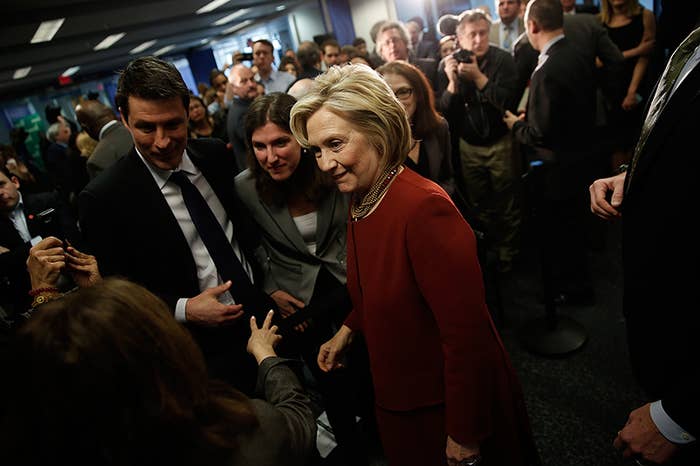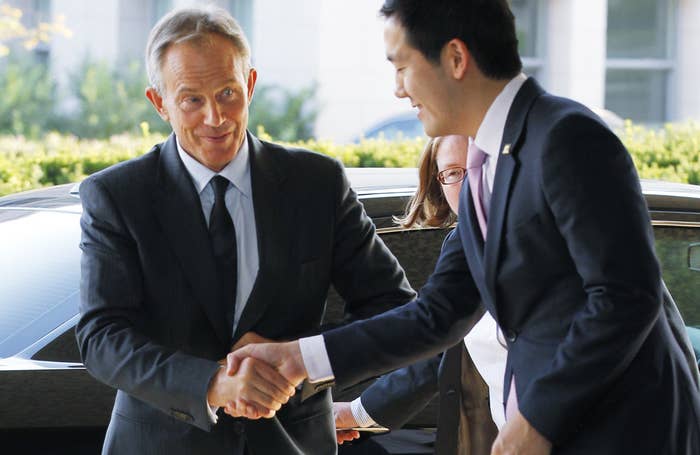
Dennis Cheng is no Terry McAuliffe.
He is quiet and private, guarded and discreet. He would rather sit at his desk, placing calls to donors or studying spreadsheets, than be seen with the candidate at her latest fundraiser. He does not back-slap, glad-hand, or arm-punch.
Some use the word "micromanager" — others prefer "thorough" or "detail-oriented." But there is no question that Cheng, the 35-year-old who will serve as finance director on Hillary Clinton's expected presidential campaign, is a departure from fundraisers like McAuliffe, the governor who for years marshaled the Clintons' sprawling, complex network of donors with his famously gregarious style.
During her last campaign, Clinton built a fundraising operation cast in the distinct mold of a McAuliffe type: Her loose, hands-off finance director, Jonathan Mantz, appointed deputies to help run his team in the field and, to the frustration of aides at headquarters, often left the office to travel with Clinton or her husband.
Democratic fundraisers and donors who support the campaign, which is expected to launch in some form this spring, said Cheng's approach isn't better or worse. Just different. But many were quick to cast his reputation as disciplined and discreet as a better fit for the no-drama campaign Clinton hopes to build this time around.
"There's a lot of pressure that comes with raising money. It's one of the positions in a campaign where you can see success, and everybody can see it, too," said Julianna Smoot, the lead fundraiser on President Obama's presidential campaigns. "Dennis is very smart and steady. When there's work to be done, he just puts his head down and gets it done."
Even with a sparse Democratic field, the task ahead is massive.
Clinton could have to raise as much as the $1.1 billion Obama needed during the last election, without the advantages of incumbency: From the start, his campaign had a joint fundraising effort with the Democratic National Committee that allowed for higher contribution limits, and access to the group's fundraising lists. (Clinton's have not been updated since 2008, and it is not yet clear whether her campaign will acquire the list built by Ready for Hillary, a super PAC launched in 2013.)
Since last month, Cheng has been assembling a finance team whose shape, reporting structure, and key players look little like the campaign of 2008.
One significant change will be apparent from the launch, according to a source familiar with Cheng's plans. The campaign will focus exclusively on primary dollars — a move that reflects a new approach Clinton has tried to project: that should she run, as her spokesman often tells reporters, "she will take nothing for granted."
In her last race, while Obama asked for primary contributions only, Clinton raised for the general election as well. (The funds are kept separate.) It was money she was never able to use. After the election, the campaign refunded millions in general contributions, causing a logistical nightmare for Clinton's remaining staff.
Cheng has also stacked his finance team with new faces. Only two of the lead regional fundraising roles, of which there are at least eight, have been given to staffers from Clinton's last run: Yaël Ouzillou, who is based in Texas, will handle the South Central, and Jon Adrabi, a Florida fundraiser, will oversee the Southeast.
The finance operation is one that will be notably "flat," according to fundraisers and donors briefed on the team that Cheng is said to still be assembling.
The structure grants more oversight than is typical to a finance director on a campaign of this scale: Cheng will directly supervise the lead regional fundraisers, referred to internally as "super regionals." He is said to be considering hiring deputies in the Brooklyn headquarters, but only to help on an operational level.
The eight super regionals will each be based in a different swath of the country. Assignments include the Northeast, Midwest, Mid-Atlantic, Northwest, Southwest, South Central, Southeast, and the Tri-State area around New York. Those fundraisers plan to each oversee deputies assigned to states and cities.
Clinton has also decided against appointing a national finance chair — a role sometimes given to a presidential campaign's biggest booster. (There may be a finance committee, a source said, with members chosen based solely on performance.)
The set-up leaves Cheng to oversee the national picture and the team of super regionals, while also handling relationships with the biggest donors and "bundlers," the high-powered supporters who volunteer to raise money from other donors.
But people who have worked with Cheng say that his controlled and methodical style has made him a well-respected and trusted member of Clinton's world.
"Dennis won't go around and be your drinking buddy. He's a solid guy who you can count on," said Alan Patricof, a longtime Clinton fundraiser. "He's going to run a professional operation and accomplish the objective."

Cheng began working for Clinton on her Senate campaign, and in 2008 served as the finance director in New York, her highest-grossing state. After the presidential campaign, Cheng followed Clinton to the State Department, where he served as deputy chief of protocol under Capricia Marshall, a longtime Clinton adviser and a former ambassador.
He was brought into the Clinton Foundation as chief development officer in 2013, a time when the fundraising operation there was badly in need of organization.
Cheng brought a firm hand, leading the drive to raise $250 million for an endowment to sustain the foundation through a possible presidential campaign and for years beyond the Clintons' lifetimes. (Foundation officials are said to be about $2 million away from meeting the endowment goal. They ultimately hope to raise $500 million.)
Cheng left the foundation last month to help prepare for the presidential race. He is no longer involved the organization's fundraising, which has drawn increased scrutiny this year for accepting foreign contributions after Clinton's exit from the State Department.
Because of his long run, and varied roles, in the former first family's orbit, Cheng comes with a better grasp then most of the expansive community of Clinton donors, many of whom bring their own distinct histories, dating back to the early '90s.
"Anyone can look at a list of donors and determine who has done what. That's easy. What Dennis knows is not going to be on any list," said one of the top fundraisers for Clinton's last campaign. "Who lent their plane to Bill Clinton to go to Africa? Who helped them get a singer to perform at a Clinton Foundation gala?"
"That's not on a list. It's institutional memory," said the fundraiser.
Nancy Jacobson, who served as a senior finance adviser on Clinton's last campaign and is married to her former pollster Mark Penn, also described Cheng as most skilled at maintaining relationships with supporters. He will be "deft at making one and all feel important and included in the campaign," said Jacobson.
The campaign is still in the process of hiring across all departments.
Cheng has spent the last month finalizing his team.
The super regionals, according to sources familiar with the hires, include: in the Northeast, Kathy Gasperine, of Obama's policy arm, Organizing for Action; in the Midwest, Marcus Switzer, who worked on Obama's reelection; in the Mid-Atlantic, Angelique Cannon, former finance director for the Democratic Senatorial Campaign Committee; in the Northwest, Lindsay Roitman, a fundraiser for Sen. Maria Cantwell; in the Southwest, Stephanie Daily, a fundraiser for Los Angeles Mayor Eric Garcetti; and in the South Central and Southeast, Ouzillou and Adrabi respectively.
Cheng has also hired the New York-based Lisa Hernandez Gioia to oversee the Tri-State area — a move that some fundraisers said shows the continued influence of Huma Abedin, one of Clinton's longest-serving aides. Gioia served on multiple campaigns for Abedin's husband, former congressman Anthony Weiner. The involvement of Cannon, Gasperine, and Gioia was first reported by the New York Times.
Some Democrats said that because there are no senior roles in headquarters, Cheng has had trouble hiring.
Fundraisers interviewed for jobs have also been told that the campaign will not use consultants on the finance team, three sources said. Any who join are required to do so as full-time staff, relinquishing clients or relationships with other firms.
Members of Cheng's team who have already been tapped for roles are now working as an unpaid volunteers, along with other future Clinton staffers, until a launch.
